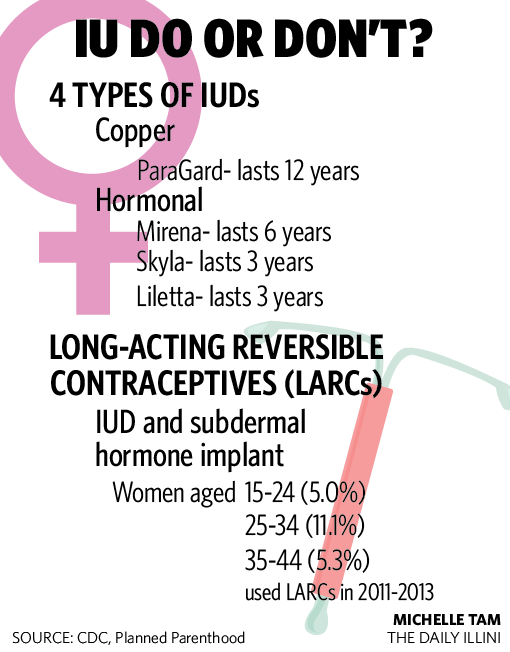McKinley Health Center one of few that offers IUD contraception for students
October 6, 2016
McKinley Health Center’s women’s health clinic goes beyond expectations when it comes to contraceptives, said Sarah Blackstone, doctoral candidate for the department of community health and kinesiology.
“What’s really unique about McKinley is that they have a women’s health clinic,” she said.
Along with filling birth control prescriptions and making the Plan B pill available, the women’s health staff is also trained to perform Intrauterine Device (IUD) insertions and removals.
“The women’s health staff is very knowledgeable about the IUDs and they actually have the three IUDs (in the exam room) so if people have questions about them, they can see them,” Blackstone said.
McKinley offers three types of IUDs: ParaGard, Mirena and Skyla. The ParaGard is a non-hormone option that will prevent pregnancy for 12 years. Mirena and Skyla have low amounts of the hormone progestin in them and can last for five and three years respectively.
Get The Daily Illini in your inbox!
“We do counseling about how IUDs work and we do a consult visit,” Nurse midwife at the McKinley Women’s Health Clinic, Kathleen Easter, said. “Girls can come in and learn about IUDs, and if they decide that they want them, then they can come in.”
Easter approximates that her and Dr. Anne McKusick insert at least one IUD per week on average at McKinley.
“It’s amazing what women’s health offers,” she said.
Linnea Sandstrom, sophomore in AHS, said that access to birth control is “very important” to college kids.
Although trends indicate that popularity for the IUD is growing among college-aged women, it is still most popular for women in the 25-34 age range, according to a report by the Center for Disease Control in 2013.
“A lot of people get scared at the thought of having this device inserted in their uterus,” Blackstone said. “Also the upfront cost can be a little bit of a deterrent. Depending on your insurance plan, they can be kind of expensive, upwards of $800 to have the initial insertion.”
Student insurance, however, covers the IUD insertion at 100-percent of the cost, according to Easter.
Most other insurances also cover 100-percent of the cost, but not necessarily at McKinley, because some insurance companies have preferred providers which means the company will only cover the cost at a certain medical care center.
An additional reason for the hesitation is that some women are unaware that an IUD can be taken out at any time.
“I don’t think a lot of people realize that you don’t have to commit to those 12 years (in the case of the ParaGard) if you don’t want to,” Blackstone said.
In the case of all IUDs, once they are taken out, the body should continue on normally and women can begin trying to conceive right away.
Blackstone made a point to discuss IUDs in depth with her students during a lecture about contraceptives in her community health class.
“I did focus a lot on IUDs in that lecture and the reason for that is because around college-aged women and the college population in general, there’s a lot of misinformation standing with IUDs,” she said. “I feel like they’re not talked about that much, and while McKinley is unique in that their women’s health clinic is very open and transparent about IUDs, not a lot of health care providers are.”
Sandstrom believes in the importance of understanding IUDs and sexual well-being in general.
“I feel like human sexuality should be a mandatory class,” she said. “A lot of people don’t know about (women’s and men’s health) and I think if people knew about it, they’d take initiative.”
If not a mandatory class, Sandstrom thinks McKinley should have more of a presence during freshmen orientation.
There should be pamphlets handed out with McKinley’s services and hours on them. Most people don’t even know you can get a free STD test there, she said.
“I think a lot of students aren’t aware that women’s health does all that we do,” Easter said. “We do annual (checkups) and you can get any kind of birth control or contraception that you want.
Anything that you can get at the OBGYN, except prenatal care, we can do.”
Easter and the McKinley staff always encourages students to come in with any medical questions they may have, and for students to not feel “embarrassed” about asking those questions.
“In general, U of I seems to have a lot of really excellent resources for promoting sexual well being,” Blackstone said.
“(But) I think it’s important for women to know that there’s a place that they can go with their concerns. I think it’s a really good environment to get those concerns addressed.”







